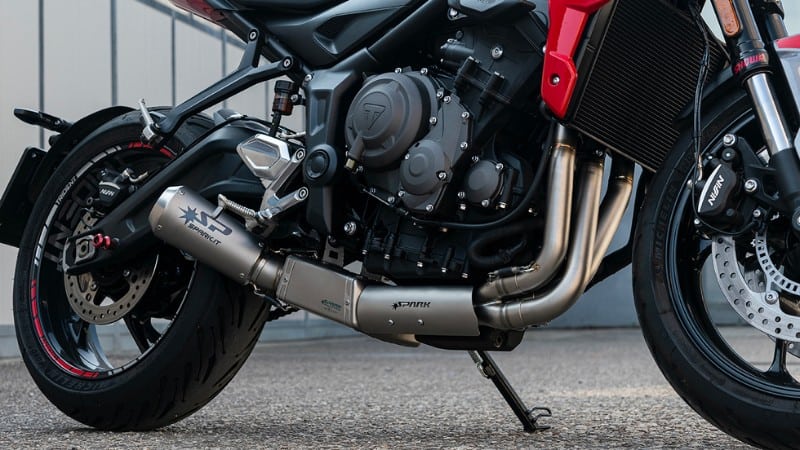What Happens When You Decat A Motorcycle? – (Pros & Cons)
All motorcycle exhausts have a catalytic converter that filters the harmful pollutants from fuel burning. Many motorcyclists prefer decatting the exhaust system to make the motorcycle exhaust loud, which feels more powerful. However, the authority does not recommend it, and you may get a ticket for decatting your motorcycle.
So, what happens when you decat a motorcycle? When you decat your motorcycle, the fuel economy and performance improve slightly. Also, your motorcycle exhaust will become louder and feel more powerful while riding. But, decatting the motorcycle results in increased emissions.

Table of Contents
- 1 What Does A Catalytic Converter Do?
- 2 What Happens When You Decat A Motorcycle?
- 3 What Are The Benefits Of Decat Exhaust?
- 4 Will Removing Catalytic Converter Improve Motorcycle’s Performance?
- 5 Is It Legal To Decat A Motorcycle?
- 6 Does Cat Delete Make Motorcycle Louder?
- 7 Does Having No Exhaust Use More Fuel?
- 8 Is Decat Bad For Engine?
- 9 Conclusion
What Does A Catalytic Converter Do?
A catalytic converter is an important device installed on any vehicle’s exhaust system. The function of a catalytic converter is to absorb the harmful particles coming out from the exhaust gases of an engine.
The catalytic converter has some precious metals, like platinum, palladium, and rhodium, that convert harmful pollutants like CO (Carbon Monoxide), NOx (Nitrogen Oxide), and HC (unburnt Hydrocarbons) into harmless particles like CO2 (Carbon Dioxide), N2 (Nitrogen), and H20 (Steam).
What Happens When You Decat A Motorcycle?
Deleting the catalytic converter is a popular motorcycle modification for riders to make the exhaust loud. Decatting a motorcycle means removing the catalytic converter from the exhaust system.
When you remove the catalytic converter from your motorcycle exhaust system, your motorcycle feels powerful and louder. You might also notice improved performance and mileage. But your motorcycle will emit harmful gases like nitrogen oxide and carbon monoxide into the environment, and you may get a ticket for it.
So, decatting a motorcycle is not good for the environment because it promotes air and noise pollution.
What Are The Benefits Of Decat Exhaust?
A catalytic converter is installed inside the exhaust pipe, which restricts the direct flow of exhaust gases to the environment.
This creates back pressure on the engine that slightly reduces its performance. Deleting the catalytic converter ensures a smooth flow of exhaust gases, increasing the motorcycle’s performance.
There are three benefits of decatting an exhaust–
- You’ll get engine performance due to the smooth flow of exhaust gases.
- You’ll get a slight improvement in gas mileage.
- Your motorcycle will feel more powerful due to the louder exhaust.
Note– Decatting a motorcycle will increase the emission of harmful gases to the environment and decrease the resale value.
Will Removing Catalytic Converter Improve Motorcycle’s Performance?
Technically, removing a catalytic converter improves the motorcycle’s performance. It’s because a motorcycle has a 4-stroke engine, and being an automobile engineer, I better understand the functioning of the 4-stroke petrol engine.
I’ll simplify it for you…
- Suction Stroke: In the first stroke, the inlet valve opens, and the piston sucks the air-fuel mixture from the carburetor.
- Compression Stroke: The second stroke compresses this air-fuel mixture, increasing its temperature and pressure. The spark plug ignites the compressed air-fuel mixture at the end of the compression stroke.
- Expansion Stroke: Due to a spark, the air-fuel mixtures ignite and blast in the engine cylinder, which pushes the piston downward and rotates the crankshaft.
- Exhaust Stroke: In the final stroke, the valve opens, and the piston pushes the burnt gases through the pipe.
A catalytic converter in a honeycomb shape installed in the exhaust pipe restricts the direct flow of gases to the environment. But, an engine is designed for the free flow of exhaust gases. So, due to restriction, the exhaust gases create back pressure on the engine, which slightly reduces its performance.
Is It Legal To Decat A Motorcycle?
The legality of decatting depends upon where you live. In some states and countries, decatting a motorcycle is legal, while in other states, it’s strictly prohibited by the laws. Also, it depends upon the purpose.
In some states, decatting is allowed for off-roading and racing tracks. However, your exhaust must have a catalytic converter if you ride on a public street.
So, before modifying your motorcycle’s exhaust system, please be familiar with the laws and regulations of your area. Otherwise, decatting can result in fines, impoundment of the vehicle, or even criminal charges.
In the European Union, decatting a motorcycle is prohibited by the laws. It’s because they have strict regulations for emissions.
A catalytic converter converts harmful particles like HC, NOx, and CO into harmless substances like H2O, N2, and CO2.
A motorcycle will fail an emission test without a catalytic converter, and the owner can not register it and get a number plate to ride on the roads.
So, if your state has motorcycle emission test laws, don’t remove the catalytic converter from your motorcycle.
While removing the catalytic converter from a motorcycle slightly increases the horsepower and engine performance, it increases the emission of harmful gases like NOx (Nitrogen Oxide), HC (Hydrocarbons), and CO (Carbon Monoxide). It also increases noise pollution and reduces the resale value.
Does Cat Delete Make Motorcycle Louder?
Yes, decatting a motorcycle makes it louder because of the free flow of exhaust gases without any restriction.
It increases noise and air pollution, which may irritate you or others when you ride on the public street. That’s why decatting a motorcycle is prohibited in many states and countries.
Does Having No Exhaust Use More Fuel?
Your exhaust system doesn’t control fuel consumption. In modern motorcycles, a fuel injector takes commands from the ECU (electronic control unit) and injects according to the throttle position and other data.
However, an O2 sensor on the exhaust pipe sends the data to the ECU. It calculates the amount of unburnt oxygen in the exhaust gases and adjusts the air-fuel ratio for the Stoichiometric ratio and optimum gas mileage.
So, removing the O2 sensor from the exhaust pipe won’t inform the ECU about the presence of unburnt oxygen molecules, and your ECU won’t control the correct air-fuel mixture. This may lead to a drop in gas mileage.
Also Read: How Many MPG Does A Motorcycle Get?
Is Decat Bad For Engine?
Your motorcycle ECU, aka Engine Computer, has data fed according to factory conditions (including the catalytic converter’s back pressure).
When you decat your motorcycle, the ECU will not get data according to the designed value, and it may not maintain a Stoichiometric ratio.
This may result in engine overheating and a high wear rate for the engine’s components. Although you won’t notice it in the short term, it may damage the engine components in the long term.
So, whenever you’re decatting your motorcycle, you must remap your ECU data with a professional mechanic.
Conclusion
Motorcyclists remove the catalytic converter and install hollow exhaust pipes to achieve more horsepower and louder sound. But, it increases the emission of harmful gases to the environment, which is illegal in many states and countries. Being a responsible citizen, you should not delete the catalytic converter from your exhaust system to keep the environment clean.





